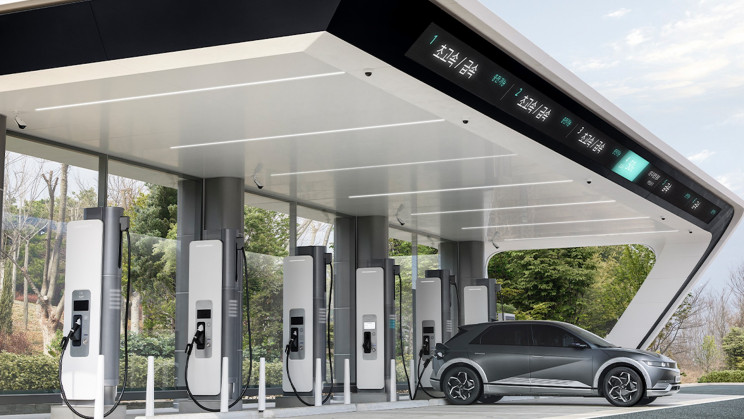
The Indian Government has been promoting faster adoption of Electric Vehicles (EVs). However, the biggest challenge EV manufacturers face is the lack of EV charging infrastructure across the country. Thus, establishing an EV charging station is an excellent opportunity in India. An EV charging station facilitates electric charging points for EVs.
Any individual or entity can establish EV charging stations in parking lots or on the roads to provide charging services for EVs. Find out more about how to set up an EV charging station in India, how to get a license and EV charging station setup costs in India.
How to get a license for an EV charging station?
The Indian government has stated that all individuals can set up an EV charging station without any license across India. However, they must meet the technical standards and guidelines of the Power Ministry.
Government policy on EV charging stations
The Central Government has issued the following guidelines regarding setting up EV charging stations in India:
- Putting up an EV charging station every 3 km in the cities, 100 km on roads for heavy-duty vehicles, and 25 km on the highway is compulsory.
- Setting up an EV charging station is license-free for an individual in India.
- Individuals setting up EV charging stations should follow the guidelines of the Power Ministry of India.
EV charging station guidelines
The Ministry of Power has issued consolidated guidelines and standards for EV charging infrastructure. These guidelines also provide a phase-wise installation of EV charging infrastructure for big cities and megacities. Below are the crucial guidelines and data issued by the Ministry of Power and Niti Aayog:
- EV users can charge their electric vehicles at their offices and residences using the existing electricity connections.
- The state government will fix and decide the ceiling of service charges that the charging stations can charge.
- The tariff on the supply of electricity in public EV charging stations will be a single-part tariff and will not exceed the average supply cost till 31 March 2025.
- The public EV charging stations or chains of EV charging stations can obtain electricity from a power generation company through open access.
- The government has made it compulsory for electricity boards to grant new EV charging stations with a connection within seven days in metro cities, 15 days in municipal areas and 30 days in rural areas.
- Public EV charging stations should tie up with at least one online network service provider to enable online booking/advanced remote charging slots by EV owners.
- Public EV charging stations must follow the performance standards set by the Ministry of Power and the Central Electricity Authority for electric charging stations.
- The Electricity Distribution Company licensed for a particular area will accept the request of an individual or entity asking for connectivity to set up a public EV charging station.
- The power supply can also be granted to EV charging stations directly from the electricity generation and supply company.
- Public EV charging stations can be set up at private offices and residences, and the electricity DISCOMS will facilitate the same.
How to set up an EV charging station in India?
Choose the suitable charger mix
While setting up an EV charging station, the individual or entity should select the charger type they want to provide in their charging stations. The charger may be a fast charger, rapid charger or slow charger. The location of the charging station plays a major role in selecting the charger.
For example, EV users will usually opt for a quick recharge in EV stations close to restaurants on the highway since they do not prefer to wait long for recharge during the journey. On the other hand, EV users usually opt for overnight charging of EVs located in hotels or lodges where they stay overnight. Thus, EV charging stations should understand the requirements of EV users in that location and select the suitable mix of chargers.
Check the EV charging policy
Certain states have favourable EV charging policies, such as getting electricity at a subsidised rate for charging stations rather than normal commercial rates. Understanding the policy and regulations of the state government where the EV charging station is to be set up helps provide uninterrupted, reliable and cost-effective power to EV users.
Select the right partner
It is essential to get the right partner that not only installs the charging station but also helps promote the charging station, gets desired visibility among the EV users, and successfully operates and maintains the charging station during its work life.
Infrastructure requirements for setting up EV charging station
The following infrastructure requirements are essential to set up an EV charging station:
- Installation of substation equipment, transformer and safety equipment.
- 33/11 KV cables and related equipment for meters and lines.
- A designated and safe parking area to enable customers to park their cars while charging them.
- Installation of all charger models approved by international and local standards.
- Installation of chargers used by EV users, i.e. rapid chargers, fast chargers and slow chargers. Their charging ability varies in each charger.
- Adequate security measures to wait while vehicles are getting charged.
Government initiatives for setting up EV charging stations
The Government of India has taken steps to reduce the cost of setting up EV charging stations to help make EVs popular. Since no license is required to set up an EV charging station, the cost of charging infrastructure is reduced significantly. Further, individuals or entities can choose any charger type and invest at their convenience.
The government also allows EV charging station owners to source power from any authorised service providers. They are free to use any technology that meets the official safety standards. However, the government has mandated EV charging stations to tie up with at least one network service provider for online booking EV charging slots.
EV charging station setup cost in India
The average cost for setting up a public EV charging station in India varies from Rs.1 lakh to Rs.50 lakh. The cost can be classified as below:
- Infrastructural costs
- Charger costs
Infrastructural costs for setting up EV charging stations
The infrastructural costs include equipment and land required for the EV charging station. The cost break-up is as follows:
| Requirement | Cost |
| Land lease at Rs.50,000 per month | Rs.6,00,000 |
| Electricity transformers, connections and energy meters | Rs.7,50,000 |
| Civil works | Rs. 2,50,000 |
| Maintenance and technical team | Rs.3,00,000 |
| Marketing and brand promotion | Rs.50,000 |
| EVSE management software and integration | Rs.40,000 |
Note: The mentioned costs above are estimated costs that may differ according to the place of the EV charging station.
Charger costs for setting up EV charging stations
According to government guidelines, public EV charging stations must have at least two slow (AC) chargers and three fast (DC) chargers. The cost of level 1 chargers is lower than level 2 and 3 chargers. The cost of different chargers is as follows:
| Type of charger | Cost |
| Bharat AC – 001 | Rs.65,000 |
| Bharat DC – 001 | Rs.2,47,000 |
| Type 2 AC | Rs.1,20,000 |
| CHAdeMO | Rs.13,50,000 |
| CCS | Rs.14,00,000 |
Note: The costs mentioned above may differ depending on its suppliers.
EV charging station franchise
An individual or entity can establish an EV charging station as a franchise by partnering with key players in India’s EV manufacturing sector. It is a highly profitable business requiring Rs.1 lakh to 10 lakh investments. The top companies offering EV charging station franchises are as follows:
- Tata Power – Mumbai
- Charge+Zone – Vadodara
- PlugNGO – Noida
- Charge My Gaddi – Delhi
- Exicom Power System – Gurgaon
- EVQ Point – Bengaluru
- Volttie – Noida
- Dyna Hi-tech Power Systems – Navi Mumbai
How do public EV charging stations work?
Generally, an EV utilises the electrical energy stored in the fuel cells to power a motor to spin the wheels. Public EV charging stations provide electricity to charge EVs and store electricity for the ride. Public EV charging stations harness electricity from one of several sources and distribute that power to the electric vehicle. A plug goes into the vehicle’s charging port, and the other end is connected to an electrical outlet.
Largest EV charging station in India
India’s largest EV charging station was opened in 2022 at Delhi-Jaipur National Highway in Gurugram with a capacity of 121 charging points for four-wheelers. Before its establishment, India’s largest EV charging station was in Navi Mumbai, with 4 DC and 16 AC charging ports for EVs.
Subsidy on EV charging stations
In March 2023, the government announced the grant of Rs.800 crores under the FAME India Scheme Phase II to the PSU Oil Marketing Companies (OMC), i.e. Indian Oil (IOCL), Bharat Petroleum (BPCL) and Hindustan Petroleum (HPCL), for setting up 7,432 public fast charging EV stations across the country.
It includes supporting the infrastructure, such as LT and HT cables, distribution transformer, circuit breakers/isolators, AC distribution boxes, tubular or PCC mounting structures, protection equipment, fencing and civil work, generally costing up to 60% of the overall cost for setting up a public EV charging station. The infrastructure comprises the money paid to the DISCOMs by Charge Point Operators to get electricity connection. The EV installation is expected to be completed by March 2024.
Currently, there are around 6,586 charging stations across India. The addition of 7,432 public EV charging stations will significantly push the EV charging ecosystem. The charging capacity will be used to charge electric two-wheelers, four-wheelers, minibuses and light commercial vehicles.
Fast-charging stations will be set up in all metros, cities and smart cities notified by the MoHUA, cities of hilly states, expressways and highways across the country. It will provide EV owners with a convenient and seamless charging experience.
EV charging stations will boost the use of EVs since there will be the availability of EV charging stations across the country, making it convenient to travel inter-city and long distances. EV charging stations set up near offices, lodging and highway restaurants will help EV users quickly recharge their vehicles to travel without hassle.
Financial and Business expert having 30+ Years of vast experience in running successful businesses and managing finance.





